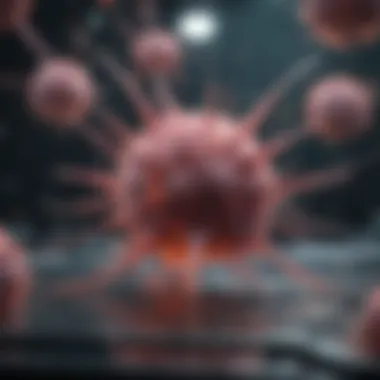UCSF Cancer Immunotherapy: Advances and Future Directions


Intro
Cancer remains one of the foremost health challenges globally, with millions of lives affected each year. Traditional treatments, such as chemotherapy and radiation, have their limitations. They might not be effective for all patients and often come with significant side effects. This has led to the exploration of alternative therapeutic options that harness the body's immune system. One of the leading institutions in this exploration is the University of California, San Francisco (UCSF).
UCSF has been at the forefront of research in cancer immunotherapy, positioning itself as a pioneer in the field. This article delves into the major advances made by UCSF in immunotherapy, shedding light on methodologies, clinical trials, and patient outcomes. By examining the institution's contributions, and addressing both the successes and challenges faced, we aim to provide a thorough understanding of the complex nature of cancer treatment. This overview will be valuable for students, researchers, educators, and professionals interested in oncology and related disciplines.
Prelims to Cancer Immunotherapy
Cancer immunotherapy stands as a transformative approach in the treatment of cancer. Its significance lies not only in its innovative use of the body's immune system to combat malignancies but also in the evolving understanding of cancer biology itself. This form of therapy exploits the natural capabilities of immune cells, enabling them to recognize and attack tumor cells more effectively. Such mechanisms provide a new avenue for treatment, particularly in cases where traditional therapies have limited success.
The benefits of cancer immunotherapy are profound. It offers the potential for long-lasting responses, sometimes referred to as durable remissions, which can differentiate it from conventional treatments such as chemotherapy and radiation. Importantly, immunotherapy often comes with a different side-effect profile, as it leverages the body’s own defenses rather than directly targeting cancer cells. This may result in a more tolerable treatment experience for patients.
However, the application of immunotherapy is complex. Factors such as tumor type, genetic makeup, and individual immune status play critical roles in determining the success of these therapies. Understanding these variables is essential for researchers and clinicians alike. As this article unfolds, it will delve deeper into the various modalities of cancer immunotherapy, the groundbreaking work being implemented at the UCSF Cancer Center, and the challenges that lie ahead in optimizing these treatments.
Through a comprehensive examination, we will shed light on not only the mechanisms and clinical trials associated with UCSF's immunotherapeutic research but also the impact on patient outcomes and the obstacles to widespread adoption that need addressing.
UCSF: A Leader in Cancer Research
UCSF's contribution to cancer research represents a significant paradigm shift towards more effective treatment methodologies, particularly in the realm of immunotherapy. This institution not only champions innovation but also fosters collaboration among researchers, clinicians, and industry partners. Its instrumental role in advancing cancer therapies is supported by a diverse array of programs and initiatives aimed at tackling complex oncological challenges. The expertise cultivated at UCSF sets a high standard for other institutions and highlights the transformative potential of targeted treatment strategies.
Overview of UCSF's Cancer Center
UCSF's Cancer Center is recognized as one of the premier facilities in oncology research and treatment. Located in San Francisco, this center works alongside multidisciplinary teams to provide cutting-edge patient care. The infrastructure of the Cancer Center is specifically designed to facilitate advanced research while addressing the diverse needs of cancer patients. The center has received designation from the National Cancer Institute (NCI) as a Comprehensive Cancer Center, which underscores its capability in both research and clinical application.
Key highlights of UCSF's Cancer Center include:
- A focus on interdisciplinary approaches that integrate various medical fields.
- Numerous clinical trials that explore innovative treatment options, including immunotherapies.
- Facilities for patient care that prioritize the quality of life and survivorship.
Key Research Facilities and Labs
UCSF boasts several renowned research facilities that are pivotal in the advancement of cancer immunotherapy. Each lab is dedicated to specific aspects of research, ranging from basic science to clinical applications. These facilities are equipped with state-of-the-art technology and foster an environment conducive to collaboration.
Some notable facilities include:
- The Helen Diller Family Comprehensive Cancer Center, which supports extensive research into cancer genetics and therapies.
- The Center for Immunological Sciences, focusing on the mechanics of the immune response in cancer treatment.
- The Cancer Center's Clinical Research Program, designed to bridge laboratory findings with patient care practices.
"The groundbreaking work done at UCSF blends rigorous scientific inquiry with practical application, aiming to significantly enhance patient outcomes in cancer treatment."
The integration of these innovative resources ensures that UCSF remains at the forefront of cancer research, emphasizing the vital connection between laboratory discoveries and their clinical relevance. Collaboration across disciplines is a hallmark of their approach, which further strengthens the agenda of advancing cancer therapies rapidly and effectively.
Mechanisms of Immunotherapy
Understanding the mechanisms of immunotherapy is crucial for grasping its potential in treating cancer. At its core, immunotherapy utilizes the body's immune system to identify and combat cancer cells. This approach diverges from traditional cancer treatments like chemotherapy and radiation, which often target all rapidly dividing cells indiscriminately. Immunotherapy focuses on enhancing or restoring the natural defense mechanisms of the immune system. This targeted methodology can lead to improved outcomes, lower systemic toxicity, and potentially long-lasting responses in patients.
Checkpoint Inhibitors


Checkpoint inhibitors represent a significant advancement in the field of cancer immunotherapy. These agents work by blocking the proteins that serve as checkpoints in the immune system. Normally, these checkpoints prevent the immune system from attacking healthy cells. Cancer cells can exploit these checkpoints to evade immune detection. By inhibiting these proteins, such as PD-1 and CTLA-4, checkpoint inhibitors enable T-cells to recognize and destroy cancer cells more effectively.
Besides their effectiveness, these agents have been associated with durable responses, leading to prolonged survival in various cancers, including melanoma and lung cancer. Trobuled administration may lead to immune-related adverse effects, which professionals need to manage judiciously to maximize patient benefit.
CAR T-cell Therapy
Chimeric Antigen Receptor (CAR) T-cell therapy represents a revolutionary approach to harnessing the immune system. In this therapy, T-cells are extracted from a patient’s blood and genetically engineered to express receptors that specifically recognize cancer cells. Once these modified cells are infused back into the patient, they can target and destroy cancer cells with higher precision than traditional therapies.
This treatment has shown remarkable success in hematological malignancies such as certain types of leukemia and lymphoma. However, the therapy may also prompt significant side effects, including cytokine release syndrome, necessitating careful monitoring. The durability of the remission, even after single administrations, is a notable point of interest in ongoing research.
Cancer Vaccines
Cancer vaccines differ from traditional vaccines as they aim to illicit a stronger immune response against cancers rather than prevent them. These vaccines can be therapeutic, aiming to treat existing cancer by stimulating the immune system to attack tumor cells. The vaccines are often designed based on specific antigens present on cancer cells, allowing for a targeted immune response.
Diverse forms of cancer vaccines, including peptide vaccines and dendritic cell vaccines, are under investigation within UCSF. The ultimate goal is to produce individualized vaccines that can lead to personalized treatment regimens for patients, offering tailored solutions based on their unique tumor biology.
Monoclonal Antibodies
Monoclonal antibodies are laboratory-made molecules engineered to serve as substitutes for the immune system. They can be designed to bind specifically to cancer cells, marking them for destruction by the immune system or blocking their growth signals. Agents like trastuzumab, targeting HER2-positive breast cancer, exemplify their clinical utility.
These antibodies can stimulate the immune response and are increasingly used in combination with other therapies to enhance their efficacy. Without a doubt, the role of monoclonal antibodies continues to expand, paving the way for synergistic approaches in cancer treatment.
"The sheer diversity in strategies, whether through checkpoint inhibitors or CAR T-cells, underscores the dynamic evolution of cancer immunotherapy."
In summary, the mechanisms of immunotherapy at UCSF illustrate a multifaceted approach to cancer treatment. Each method presents unique capabilities and challenges, ultimately contributing to a more personalized and effective strategy against cancer.
Clinical Trials at UCSF
Clinical trials are a cornerstone in advancing cancer immunotherapy. At UCSF, these trials pave the way for innovative treatments, validating effectiveness and safety while contributing to the broader landscape of oncology research. This section explores ongoing trials, recent findings, and the criteria used for selecting patients. Each component holds significant implications for future cancer therapies.
Ongoing Trials Overview
UCSF is currently conducting numerous clinical trials in the field of immunotherapy. These trials often focus on cutting-edge treatments such as checkpoint inhibitors and CAR T-cell therapy. The trials aim to recruit a diverse patient population, thus enhancing the generalizability of the results.
One notable ongoing study evaluates the effectiveness of Nivolumab combined with Ipilimumab in patients with metastatic melanoma. This trial showcases UCSF’s commitment to exploring combination therapies. Moreover, several trials target less common cancers, emphasizing a comprehensive approach to cancer treatment.
Key Findings from Recent Trials
Recent trials at UCSF have yielded promising results. For example, a phase II trial involving Pembrolizumab, a PD-1 inhibitor, showed significant improvement in progression-free survival rates among patients with triple-negative breast cancer. The findings indicate that immunotherapy can be a viable option for cancers that typically have poor prognosis.
In addition, the outcomes from a CAR T-cell therapy trial reveal improved overall survival in patients with refractory hematologic malignancies. These findings underline the potential of personalized approaches to immunotherapy.
"UCSF’s trials not only advance scientific knowledge but also have a direct impact on patient care and treatment options."
Patient Selection Criteria
Patient selection is critical in the context of clinical trials. At UCSF, comprehensive criteria are employed to ensure that participants meet specific health requirements. This includes considerations such as cancer type, disease stage, and prior treatment history.


Furthermore, inclusion and exclusion criteria are established based on factors like age, overall health, and presence of comorbidities. Such attention to detail helps optimize outcomes and safety for participants while providing valuable data for future studies.
In summary, clinical trials at UCSF play an integral role in the progress of cancer immunotherapy. They not only provide essential insights into treatment efficacy and safety but also reflect UCSF's leadership in addressing diverse cancer challenges. By rigorously selecting participants and pursuing innovative treatment methods, UCSF contributes significantly to the evolving field of oncology.
Impact on Patient Outcomes
The influence of cancer immunotherapy on patient outcomes is a focal point of ongoing research and clinical practice at UCSF. Enhancements in survival rates and quality of life are increasingly vital considerations in the development and application of various immunotherapeutic strategies. Analyzing these impacts not only provides insights into treatment effectiveness but also helps to shape future research directions.
Survival Rates and Quality of Life
Survival rates are a primary benchmark for assessing cancer treatment effectiveness. Immunotherapy has shown promising results in increasing the longevity of patients with various cancers, including melanoma and lung cancer. In recent years, clinical studies have illustrated that patients receiving treatments like checkpoint inhibitors can experience significant survival benefits compared to traditional therapies such as chemotherapy.
Moreover, the quality of life is equally important. Treatments that extend life while preserving or enhancing a patient’s quality of life are preferred. Immunotherapies often result in fewer severe side effects than conventional cancer treatments, which can lead to a better overall experience for patients. This improvement is crucial since many patients value the time spent living without debilitating symptoms over merely extending survival.
"Innovative therapies are reshaping the outlook for patients, allowing them not only to live longer but also to feel better during treatment."
Case Studies from UCSF
UCSF has provided substantial contributions to the body of knowledge regarding cancer immunotherapy impacts through various case studies. For example, one notable case detailed the journey of a patient with advanced melanoma who underwent CAR T-cell therapy at UCSF. Initially facing dismal prognoses, this patient showed remarkable resilience. Following the treatment, imaging studies revealed a significant reduction in tumor size, leading to a notable improvement in survival.
Another case involved patients diagnosed with non-small cell lung cancer. Those participating in clinical trials of monoclonal antibodies exhibited extended survival rates and reduced incidence of progression-free periods when compared to traditional therapies.
These real-world examples from UCSF underscore the potential for immunotherapy to not only enhance survival rates but also improve the overall treatment experience for individuals with cancer. Such data is critical in shaping future research pathways and increasing the prevalence of effective immunotherapy options in oncological practice.
Challenges in Implementation
The topic of challenges in implementation is crucial for understanding the current landscape of cancer immunotherapy. Despite the promise that these therapies hold, several barriers impede widespread application in clinical settings. Addressing these challenges is vital for improving patient outcomes and enhancing the efficacy of cancer treatment.
Adverse Effects and Management
Every medical intervention carries potential side effects, and immunotherapy is no exception. While some patients experience significant benefits, others may encounter serious adverse effects. These can range from mild symptoms to severe immune-related adverse events, which can compromise the treatment's overall effectiveness. The management of these side effects is an area of active research. It involves close monitoring of patients and developing protocols to mitigate these risks.
Key Considerations in Adverse Effects Management
- Patient Monitoring: Regular follow-ups and check-ups are necessary to detect any adverse effects early.
- Symptom Management: Utilizing corticosteroids or immunosuppressants may be required in severe cases to control the immune response.
- Patient Education: Informing patients about potential side effects can empower them to report issues promptly.
Access and Affordability Issues
Access to cancer immunotherapy remains a significant concern. While advancements have made these treatments more effective, the costs can be prohibitive. Many patients struggle to afford therapies like CAR T-cell treatment, which are often not covered by standard insurance plans. This situation raises ethical questions about equity in healthcare.
Factors Influencing Access and Affordability
- Cost of Treatment: The development and administration of immunotherapies often involve high costs.
- Insurance Limitations: Many patients face barriers due to inadequate insurance coverage or high out-of-pocket expenses.
- Geographic Disparities: Access to specialized treatment centers like UCSF is varied, leading to unequal treatment opportunities.
Evaluating Treatment Response


Determining how well immunotherapy works is essential for tailoring individualized treatment plans. Evaluation of treatment response can be complex due to the unique nature of the immune system's reaction to cancer. Standard assessment methods may not apply directly.
Approaches to Evaluating Treatment Response
- Clinical Trials: Data from clinical trials often inform best practices for treatment evaluation.
- Imaging Techniques: Advanced imaging methods like PET scans can provide better insights into how tumors respond to therapy.
- Biomarkers: Analyzing specific biomarkers can predict how a patient may respond, allowing for better decision-making in treatment.
Future Directions of Cancer Immunotherapy
As the field of cancer treatment continually evolves, the future directions of cancer immunotherapy present a vital area of exploration. This topic captures the progress and projected advancements that hold the potential to reshape treatment paradigms. Focused research and innovative technologies are likely to improve therapeutic efficacy and expand the applicability of immunotherapy across a broader range of cancers. With ongoing advancements, this section highlights emerging trends, collaborative efforts, and personalized approaches that can better address individual patient needs.
Emerging Trends and Technologies
Emerging trends in cancer immunotherapy emphasize the development of novel strategies and technologies that can enhance treatment outcomes. Currently, the integration of AI and machine learning in drug discovery is gaining traction. These technologies can analyze vast datasets to reveal patterns that humans might overlook, leading to the faster identification of new therapeutic possibilities.
Another trend pertains to the enhancement of existing immunotherapeutic agents. For example, the optimization of checkpoint inhibitors like pembrolizumab and nivolumab is being explored to improve their effectiveness while minimizing side effects. Researchers are also investigating bi-specific antibodies and other innovative constructs that can engage the immune system more effectively against tumor cells.
Additionally, combination therapies are on the rise. By integrating different immunotherapeutic approaches or combining them with traditional treatments like chemotherapy, it’s possible to achieve synergistic effects. Such strategies might lead to improved response rates and better durability of responses in patients.
Collaborative Research Efforts
Collaboration among research institutions, healthcare organizations, and biotechnology companies strengthens the foundation for advancements in cancer immunotherapy. At UCSF, interdisciplinary teams facilitate the sharing of knowledge and resources necessary for tackling complex challenges.
Moreover, partnerships with external entities often result in innovative clinical trials that provide crucial data on the safety and efficacy of new treatments. For instance, collaborations with pharmaceutical companies can accelerate the development of promising immunotherapies while ensuring that diverse patient populations are included in clinical studies. This diversity in research helps to enhance the generalizability and applicability of findings.
This collaborative spirit not only fosters groundbreaking research but also helps in education and training. By involving various stakeholders, UCSF expands its impact through seminars, workshops, and shared resources, contributing to the broader scientific community's understanding of immunotherapy.
Personalized Immunotherapy Approaches
Personalized immunotherapy represents a tailored approach to cancer treatment, focusing on the individual characteristics of each patient's tumor and immune response. At UCSF, ongoing research aims to develop biomarkers that can predict which patients will benefit most from specific immunotherapy strategies.
By identifying unique tumor antigens or genetic mutations, medical professionals can design personalized treatments that are more likely to lead to positive outcomes. This approach minimizes the trial-and-error nature of traditional therapies and optimizes treatment plans from the outset. Additionally, patient monitoring and data collection allow for adaptive treatment strategies, adjusting therapy based on real-time patient responses.
"Personalized immunotherapy holds promise in enhancing patient responses while reducing unnecessary side effects, marking a significant advancement in cancer care."
Finale
The study of cancer immunotherapy marks a pivotal shift in oncology, particularly as spearheaded by UCSF. This field emerges as a beacon of hope for patients facing difficult prognoses. Understanding the complexities of immunotherapy brings several significant insights.
First, it underscores the promise of harnessing the body's own immune system to combat cancer. Traditional therapies often fall short, particularly in cases of metastatic disease. Immunotherapy, in contrast, tailors treatment to individual patient profiles, focusing on the specific characteristics of their cancer cells. This leads to improved responses in various cancer types, highlighting its relevance.
Second, the ongoing research at UCSF exemplifies how innovation drives the evolution of treatment approaches. With a strong emphasis on personalized medicine, UCSF's advanced methodologies integrate cutting-edge technology and collaborative efforts across multiple disciplines. These initiatives not only enhance therapeutic efficacy but also open paths for improved patient selection and treatment management.
Moreover, addressing the challenges surrounding immunotherapy, such as access and affordability, is essential for broadening its impact. Efforts to optimize treatment outcomes based on real-world data present a crucial area for future investigation. Research initiatives must prioritize finding equitable solutions that ensure diverse populations gain access to these life-saving therapies.
Overall, this article encapsulates essential information that emphasizes the significant strides made in cancer treatment through immunotherapy at UCSF. Not only does it provide valuable insights for practitioners and researchers alike, but it also delineates a clear trajectory for future advancements. By examining the evolution of these therapies and their current applications, we filter critical lessons that can be leveraged for the next generation of cancer treatment.
"The future of cancer treatment lies in the understanding and enhancement of our immune capabilities."
Summarizing Key Insights
- Harnessing Immune Responses: Cancer immunotherapy represents a significant step in utilizing the immune system to target and eliminate cancer cells.
- Personalized Approaches: Tailoring treatments to individual patients provides a more effective response, potentially increasing survival rates over traditional methods.
- Research and Development: The innovative work at UCSF underscores the importance of continuous research and development in unlocking the full potential of cancer immunotherapy.
- Challenges and Access: Addressing socio-economic barriers is critical to ensuring all patients have access to these groundbreaking therapies.
In summary, the impact of UCSF's contributions to cancer immunotherapy cannot be overstated. The collaborative, research-driven approaches pave the way for sustainable advancements that could redefine cancer care.







